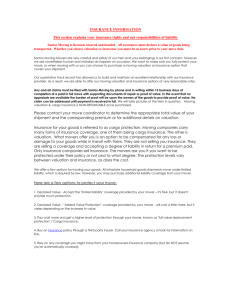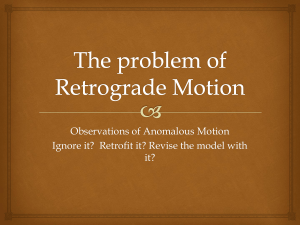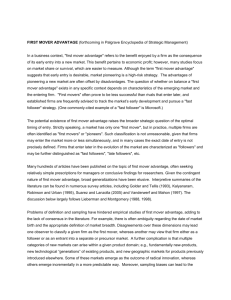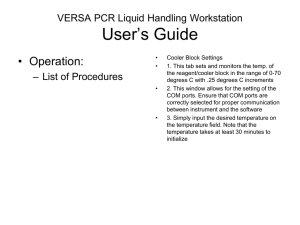IMPORTANT NOTICE TO SHIPPERS OF HOUSEHOLD GOODS
advertisement
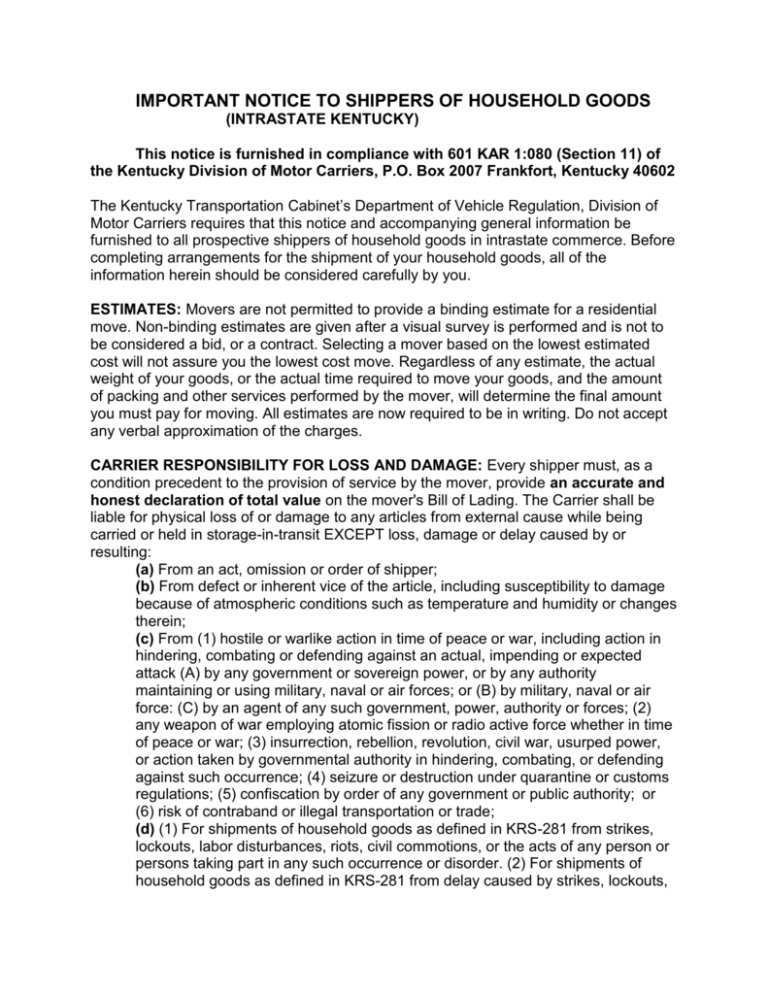
IMPORTANT NOTICE TO SHIPPERS OF HOUSEHOLD GOODS (INTRASTATE KENTUCKY) This notice is furnished in compliance with 601 KAR 1:080 (Section 11) of the Kentucky Division of Motor Carriers, P.O. Box 2007 Frankfort, Kentucky 40602 The Kentucky Transportation Cabinet’s Department of Vehicle Regulation, Division of Motor Carriers requires that this notice and accompanying general information be furnished to all prospective shippers of household goods in intrastate commerce. Before completing arrangements for the shipment of your household goods, all of the information herein should be considered carefully by you. ESTIMATES: Movers are not permitted to provide a binding estimate for a residential move. Non-binding estimates are given after a visual survey is performed and is not to be considered a bid, or a contract. Selecting a mover based on the lowest estimated cost will not assure you the lowest cost move. Regardless of any estimate, the actual weight of your goods, or the actual time required to move your goods, and the amount of packing and other services performed by the mover, will determine the final amount you must pay for moving. All estimates are now required to be in writing. Do not accept any verbal approximation of the charges. CARRIER RESPONSIBILITY FOR LOSS AND DAMAGE: Every shipper must, as a condition precedent to the provision of service by the mover, provide an accurate and honest declaration of total value on the mover's Bill of Lading. The Carrier shall be liable for physical loss of or damage to any articles from external cause while being carried or held in storage-in-transit EXCEPT loss, damage or delay caused by or resulting: (a) From an act, omission or order of shipper; (b) From defect or inherent vice of the article, including susceptibility to damage because of atmospheric conditions such as temperature and humidity or changes therein; (c) From (1) hostile or warlike action in time of peace or war, including action in hindering, combating or defending against an actual, impending or expected attack (A) by any government or sovereign power, or by any authority maintaining or using military, naval or air forces; or (B) by military, naval or air force: (C) by an agent of any such government, power, authority or forces; (2) any weapon of war employing atomic fission or radio active force whether in time of peace or war; (3) insurrection, rebellion, revolution, civil war, usurped power, or action taken by governmental authority in hindering, combating, or defending against such occurrence; (4) seizure or destruction under quarantine or customs regulations; (5) confiscation by order of any government or public authority; or (6) risk of contraband or illegal transportation or trade; (d) (1) For shipments of household goods as defined in KRS-281 from strikes, lockouts, labor disturbances, riots, civil commotions, or the acts of any person or persons taking part in any such occurrence or disorder. (2) For shipments of household goods as defined in KRS-281 from delay caused by strikes, lockouts, labor disturbances, riots, civil commotions, or the acts of any person or persons taking part in any such occurrence or disorder, and loss or damage when the carrier, after notice to shipper or consignee of a potential risk of loss or damage to the shipment from such causes, is instructed by the shipper to proceed with such transportation and/or delivery, notwithstanding such risk. (e) From acts of God. In addition to the foregoing, to the further following limitations on the carrier's liability, The carrier's maximum liability shall be either: (1) The amount of the actual loss or damage not exceeding $1.25 times the actual or constructive weight (in pounds) of the shipment, or the lump sum declared value, whichever is greater; or Replacement Value if the shipment is released at $3.50 times the actual or constructive weight in pounds of the shipment. (2) The actual loss or damage not exceeding sixty (60) cents per pound of the weight of any lost or damaged article when the shipper has released the shipment to carrier, in writing, with liability limited to sixty (60) cents per pound per article. ARTICLES OF EXTRAORDINARY OR UNUSUAL VALUE: All items included in your shipment that are considered to be of extraordinary (unusual) value must be specifically identified and the carrier must be advised that they are included in the shipment. Items of extraordinary value are defined as those having a value greater than $100 per pound. Typical household goods items that frequently have a value in excess of $100 per pound are: coins, jewelry, precious metals, precious or semi-precious stones or gems, gold, silver or platinum articles including silverware and service sets, china sets, crystal or figurines, fur or fur garments, antiques, oriental rugs or tapestries, rare collectible items or objects of art, computer software programs, manuscripts or other rare documents. Of course, other items may also fall in this category and must be identified as well. An Inventory of Articles of Extraordinary or Unusual Value, Form C70993, must be completed prior to any service being performed by the mover. Should this statement pertaining to articles of extraordinary or unusual value not be made by the shipper prior to the move, the mover's liability will be limited to a maximum of $100 per pound for any item(s) damaged or lost. PACKING, UNPACKING AND CONTAINERS: You may choose to have the mover perform all or a portion of the packing necessary to provide protection for your fragile items. Charges for these services are on a "per container" basis and are available from your mover upon request. However, the carrier is not responsible for damage resulting from faulty packing you perform. Moving company personnel may inspect the cartons you have packed prior to loading the van, and if after inspection, it is their opinion that articles are improperly packed or that the cartons are susceptible to damage, the mover may refuse to load the cartons until the questionable items are repacked by the mover, or removed from the shipment. There would be additional charges for any packing services performed by the mover. NOTIFICATION OF CHARGES AND DELAY: The mover is required to notify you by telephone or telegram of any delays in delivery. The mover is also required to notify you of the amount of the charges if you request it or if they exceed the estimate by more than 10% or $25, whichever is greater. Be sure to provide the mover an address and/or a telephone number where such notifications can be received. The mover's tariff specifies a waiting time charge for delays not the fault of the mover; therefore, you should plan to be at origin and destination on or before the agreed upon pickup and delivery times. BILL OF LADING CONTRACT: The bill of lading is the contract between you and the mover. The mover is required by law to prepare a bill of lading for every shipment it transports. It is your responsibility to read the bill of lading before you sign it. If you do not agree with something on the bill of lading, do not sign it until you are satisfied that the bill of lading shows what service and type and amount of protection you want. The bill of lading requires the mover to provide the service you have requested and you must pay the mover the charges for the service. PAYMENT: At the time of payment for the transportation charges, the mover must provide a freight bill identifying the service provided and the charge for each service. Unless credit arrangements have been made prior to moving day, you will be expected to pay the total charges appearing on the freight bill at the time of delivery. It is customary for movers that freight charges must be paid in cash, by certified check, or money order. Some movers permit payment of freight charges by use of a credit card. However, these arrangements must be made with your mover prior to moving day. Ask your mover at the time the estimate is made. CLAIM FOR LOSS OR DAMAGE: All claims for loss and damage must be filed in writing with the mover within nine months of the date of delivery. The mover is required to acknowledge claims within 30 days and to either pay, decline or make a firm compromise settlement offer within 120 days of receipt. Any suit must be instituted within two years and one day after the date on which a written denial has been made by the mover. The Kentucky Transportation Cabinet’s Department of Vehicle Regulation has no authority to compel movers to settle claims and will not undertake to determine whether the basis for or the amount of a claim is proper, nor will it attempt to determine if the mover is liable for such loss or damage. TARIFFS: These are publications, in book form, containing the rates, charges, and rules of the carriers. In determining the charges on your shipment, the carrier serving you must apply the provisions of the tariff on file with the Kentucky Department of Vehicle Regulation, Division of Motor Carriers that pertains to the movement of household goods. Tariffs on file are open to public inspection.
